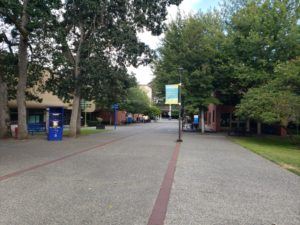Back in the spring, when we were first adjusting to this new way of life in British Columbia, Camosun International feared the worst. The COVID-19 crisis could very well have rendered the department obsolete, but, while there is a dip in enrolment, it would appear that the numbers aren’t too catastrophic: there are about 300 less international students who have enrolled and paid their $1,000 deposit than there was this time last year. The college will have their final numbers on September 21, which is the stable enrolment date—the day on which students can no longer get their tuition refunded.
“We know that it’s probably going to work out to be just around 1,300 international students,” says Camosun vice president of partnerships Geoff Wilmshurst. “Last year, it probably would have been closer to 1,600 students. This number, actually, is not bad, considering the COVID situation.”

Wilmshurst says the college is feeling fortunate and originally anticipated it would be a much smaller number. (The estimation includes students who are studying online from abroad, those who came here to study online, and those attending campus.) The higher-than-originally-anticipated numbers are partially because a significant amount of international students—probably over 90 percent, says Wilmshurst—stayed in Victoria after the winter semester.
“Over this course of the last two months, we’re aware of probably about 30 students that have come back,” he says, “and we have on our list about 50 students who have indicated they are planning to come.”
The number of students who will be on campus is very small, “in the tens,” says Wilmshurst, and will likely only be those studying lab sciences and trades.
“Some of them have been here already and done their 14 days [isolation],” says Wilmshurst. “What I would say is that some students already have their accommodation. It may be that they went home in March and are now coming back.”
Students arriving in BC need to email Camosun International to notify the college they are coming to Canada; submit an official Quarantine Plan to the federal government and a BC Self-Isolation Plan to the provincial government; and submit the BC Self-Isolation Plan to Camosun International. (Further information on the plans and processes can be found at camosun.ca/covid19/quarantine.) Camosun has secured rooms for students in a couple local hotels, and the college will also provide students in need with hampers containing food and toiletries. (Students can sign up for a hamper at webservices.camosun.ca/events/camosun-cares.)
“One way or another, they have to have a quarantine plan, which they have to complete in writing, and we supply them with the documentation, and when they arrive at the border, that’s one of the things they need to show,” says Wilmshurst. “We’ve been putting together food-and-necessity hampers for incoming students who need that.”
One challenging aspect an international student studying from abroad may face is if the course is synchronous, the student may have to be up at, for example, 1 am to tune into a live lecture.
“We will have students who will be online, and presumably, up in the middle of the night watching a live lecture,” says Wilmshurst. “In our Arts and Sciences school, the majority of our courses are being offered in an asynchronous manner, which is really good.”
